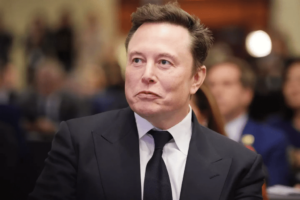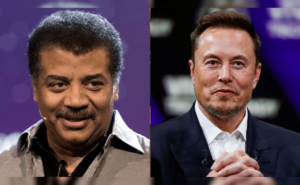In a showdown that feels like it could only happen in 2024, two of the most prominent voices in science and innovation—Elon Musk and Neil deGrasse Tyson—have clashed over one of humanity’s most ambitious dreams: colonizing Mars. Their argument is a masterclass in nerdy sparring, rooted in differing visions of humanity’s future among the stars.
Let’s unpack what sparked this cosmic feud, the criticisms lobbed, and how Musk, ever the tech maverick, responded with his trademark bravado.

Neil deGrasse Tyson’s Take on Mars Colonization
During an appearance on Real Time with Bill Maher, astrophysicist Neil deGrasse Tyson did not hold back his skepticism regarding Musk’s ambitious plans to colonize Mars.
“I have strong views on that,” deGrasse Tyson began, before diving into a critical analysis of space exploration history. He argued that humanity has historically undertaken grand, expensive endeavors only when geopolitically necessary—like during the Space Race of the Cold War. To him, the push for Mars doesn’t fit that pattern.
Tyson questioned the practicality of Musk’s Mars vision, suggesting it may be less about scientific necessity and more about novelty. “It’s the next thing to do,” he said, casting Musk’s goals as a venture capitalist’s gamble, rather than a step toward genuine progress. He further noted that finding investors to back such a high-risk venture could prove nearly impossible, and warned that any failure could have dire consequences, potentially costing lives.
Adding to the tension, deGrasse Tyson noted the political backdrop, hinting that President-elect Donald Trump’s supposed interest in Mars could make things even more complicated. He concluded, “At some point, somebody has to pay for it, and just being interested in something is not the same as paying for it.”
Elon Musk Fires Back on Social Media
Elon Musk, never one to shy away from a challenge—or a chance to clap back—responded to Tyson’s comments with a pointed statement on X (formerly Twitter). His retort was as ambitious as his Mars plans: “Wow, they really don’t get it. Mars is critical to the long-term survival of consciousness.”
Musk doubled down on his rationale for colonizing the Red Planet, positioning it as a vital step in safeguarding humanity from potential existential threats. Whether it’s asteroid impacts, climate catastrophes, or nuclear war, Musk has long argued that a multiplanetary existence is humanity’s best insurance policy.
Wow, they really don’t get it.
Mars is critical to the long-term survival of consciousness.
Also, I’m not going to ask any venture capitalists for money. I realize that it makes no sense as an investment. That’s why I’m gathering resources.
— Elon Musk (@elonmusk) November 23, 2024
He also addressed Tyson’s criticism about funding, making it clear that he has no intention of leaning on venture capitalists. “I realize that it makes no sense as an investment,” Musk wrote. “That’s why I’m gathering resources.” By resources, Musk likely refers to the immense fortune he’s amassed, positioning himself as one of the only people capable of funding such an audacious project.
The Bigger Picture: Why Musk Believes in Mars
For Musk, Mars isn’t just a pet project—it’s a mission rooted in his belief in the inevitability of humanity’s need to leave Earth. Through SpaceX’s Starship program, Musk envisions making life “multiplanetary,” with plans to send a million people to Mars within decades.
But his vision doesn’t stop at transportation. Musk’s idea of a Mars colony includes sustainable infrastructure: solar-powered habitats, greenhouses for food, and life-support systems that would enable humans to thrive in the harsh Martian environment.
However, Musk has acknowledged the challenges. Colonizing Mars will not be a luxury retreat but a survivalist’s dream. He has even compared early settlers to the pioneers of the American frontier—hardship and sacrifice will be inevitable.

The Critics: Tyson Isn’t Alone
Neil deGrasse Tyson isn’t the only critic casting doubt on Musk’s Mars aspirations. Esteemed astronomer Martin Rees has described Musk’s plans as a “dangerous illusion,” warning that the complexities of long-term life on Mars are often underestimated. Similarly, David Kipping, an Assistant Professor in the Department of Astronomy at Columbia University, labeled the idea as “totally crazy,” pointing to the immense logistical and ethical challenges involved.
Critics argue that instead of investing billions in a Martian colony, efforts should focus on solving Earth’s problems, such as climate change and social inequality. Tyson himself has echoed this sentiment, emphasizing the need to fix issues on our home planet before venturing to another.
What Makes Musk’s Mars Plan Different?
Despite the pushback, Musk’s approach to Mars colonization is anything but conventional. SpaceX, under his leadership, has become the world’s leading space launch provider, drastically reducing the cost of space exploration with reusable rocket technology. This innovation is critical to making Mars colonization financially feasible.
Moreover, Musk’s ability to rally public interest and support for space exploration has reinvigorated a field that had stagnated since the Apollo missions. His vision isn’t just about Mars—it’s about rekindling humanity’s drive to explore and innovate on a grand scale.
The Financial Gamble
One of Tyson’s main critiques was the question of funding. Sending millions of people to Mars requires astronomical sums, and critics argue it’s an unwise allocation of resources. But Musk seems undeterred. As the world’s wealthiest individual and a soon-to-be trillionaire, Musk has the means to partially self-fund the project.
Additionally, Musk’s appointment as co-head of the Department of Government Efficiency has positioned him to influence federal spending. He’s pledged to slash $2 trillion in wasteful spending, hinting that some of those savings could be redirected toward his space ambitions.
The Public Reaction: Divided but Fascinated
The feud between Musk and Tyson has sparked widespread public interest. Supporters of Musk view him as a visionary, a modern-day explorer pushing humanity toward its destiny among the stars. Meanwhile, skeptics align with Tyson, believing that Musk’s grand plans are impractical and detract from urgent issues on Earth.
Social media has been ablaze with debates, with Musk fans rallying behind hashtags like #MarsOrBust, while others question the ethics of pouring resources into interplanetary dreams while millions struggle with basic needs.
Conclusion: A Clash of Visions
The Musk-Tyson debate is more than just a battle of egos—it’s a clash of visions for humanity’s future. Musk sees Mars as a necessity for survival, a safeguard against extinction. Tyson, on the other hand, views it as an expensive distraction from the immediate challenges we face on Earth.
Regardless of where you stand, one thing is clear: this debate has reignited public fascination with space exploration. Whether Musk’s Mars dreams materialize or not, his relentless pursuit of the stars serves as a reminder of humanity’s boundless curiosity and ambition.
As Musk forges ahead, critics like Tyson will continue to challenge him, ensuring that every step is scrutinized and every decision weighed. And maybe that’s exactly what we need—a little cosmic debate to keep us grounded while reaching for the stars.


